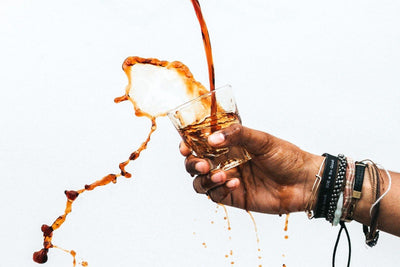There’s nothing quite like a smooth, tasty cup of coffee that’s fresh and flavorful—and there’s also nothing quite like the disappointment you get from a cup of coffee that’s overly bitter, way too sour, or just overall sad and dull.
Brewing underwhelming coffee happens to us all (even we super-obsessed folks make mistakes from time to time). If you don’t know what caused the coffee to taste bad, it can be extremely frustrating.
But if you can learn how to troubleshoot your coffee’s flavor, you can learn to bring balance back to your brew when things go wrong.
Now, don’t worry—we’re not going to go all crazy coffee science on you. But we are going to give you the information you need to take control of your coffee’s flavor, and it is going to take a little critical thinking.
Read: Have You Tasted These 11 Common Coffee Flavor Defects?
By the end of this blog, you’ll know…
- How to make your coffee less bitter
- How to make your coffee less sour
- How to make your coffee naturally sweeter
- How to tell if your beans are high-quality or low-grade
Let’s explore the first step of troubleshooting coffee.
Extraction (AKA: How Strong Is My Coffee?)
This is the key to understanding everything about coffee flavor, so let’s get this part right.
When you combine coffee and water to brew liquid coffee, you’re facilitating a process we call extraction.
Essentially, the water is pulling out ‘stuff’ from the grounds. Acids, sugars, oils, bitter compounds… and a whole slew of things that actually make up the coffee flavor.
Except, not all of these things are extracted at the same time. First come the bright acids, then the middle-range flavors and sugars and oils, then the lower flavor notes, then the super bitter stuff.
As you can imagine, there’s a ‘sweet spot’ somewhere in that extraction process. This sweet spot has just enough acids to be interesting, a smooth sweetness, aromatic oils, and just enough lower flavor compounds to round out the brightness from those acids.
We’re after the sweet spot between under and over extraction—that perfect middle area. This should frame how you think about troubleshooting coffee flavor from here on out.
A Coffee Flavor Troubleshooting Guide
I’m going to name a handful of common flavor problems and walk through possible solutions. Your job is to mindfully taste your coffee, identify the flavor problem, and try out these solutions.
Only try one fix at a time, otherwise you may over-correct and make your coffee taste even worse. One fix per brew allows you to assess whether it worked independently of other fixes. And once you’ve done this a few times, you really get a good handle on how to make your coffee taste better with different problems.
My Coffee Tastes Bitter
Bitter coffee is the result of a few different issues, so let’s explore each of them separately.
- Your coffee is over extracted. You pulled too much stuff from the beans, so you need to extract less stuff next time you brew. Here are a few ways you can do that (remember, just one at a time):
- Brew for less time (to stop the extraction earlier)
- Use more coarse grounds (to slow down the overall extraction speed)
Read: How To Taste Coffee: Bitterness
If you’re using specialty-grade and freshly roasted beans, the issue is probably your brewing process. Try one of the two fixes I mentioned, but don’t try them both at the same time. It may take a couple small adjustments over the course of 2-3 brews to really ‘dial in’ the flavor, but your coffee will slowly become more balanced and delicious.
My Coffee Tastes Sour
A little acidity makes the flavors of coffee ‘pop’, but too much just comes across and gross and sour. Not what we want when we’re trying to wake up and get ready for the day. Here’s what could be causing this:
- Brew for more time (to give the coffee a little more time to extract)
- Use finer coffee grounds (to speed up the overall extraction speed)
Read: How To Taste Coffee: Acidity
While it’s possible that you’ll come across an under roasted coffee, that’s not really common at all. Chances are you’ve under extracted, so try one of those fixes and see if it brings your brew back to balance.
Some low-grade coffees can be really acidic too, but most poorly-grown coffee beans are bitter.
My Coffee Tastes Boring And Dull
Sometimes coffee just doesn’t taste like it should. You know you have fresh beans, you know your roaster is really skilled, and you know you’re a good coffee brewer—it’s just not really all there.\
Read: Why You Need To Be Drinking Coffee Black (And How To Start)
This dull and lifeless coffee can be the most irritating of all. When it’s bitter or sour there are pretty clear directions you need to go, but with this… the fixes aren’t so obvious. Let’s look at a few causes:
There’s a lot here to experiment with, and for that I’m sorry. However, if you diligently run some light tests over the next few days, you’re sure to discover the root of the problem—and your taste buds will thank you when your coffee’s back to where it should be.
---
Bad coffee be gone! With this guide, you have all the info you need to improve your coffee’s flavor. Yes, it’s going to take a little bit of trial and error, but wouldn’t you rather change a small variable for a couple days than resign to having bad tasting coffee forever?
I’ll let you in on a secret.
High-quality coffee beans are far easier to troubleshoot that low-quality beans. Partly because they’re generally more forgiving when it comes to flavor, but also partly because they’re so rich that you can more easily tell when your slight adjustments improve the flavor.
Start off with freshly roasted, specialty-grade beans and you’ll have a much easier time making your coffee taste delicious.
We’d love to help you here—we send members of our Coffee Club beans from some of the best farms in the world, roast them to highlight the best flavors, and send them out just two hours later.
It’s the best way to stay stocked with uber-delicious, specialty-grade beans that’ll ignite your taste buds every morning with their rich flavors. Want in? Check out the Club!




